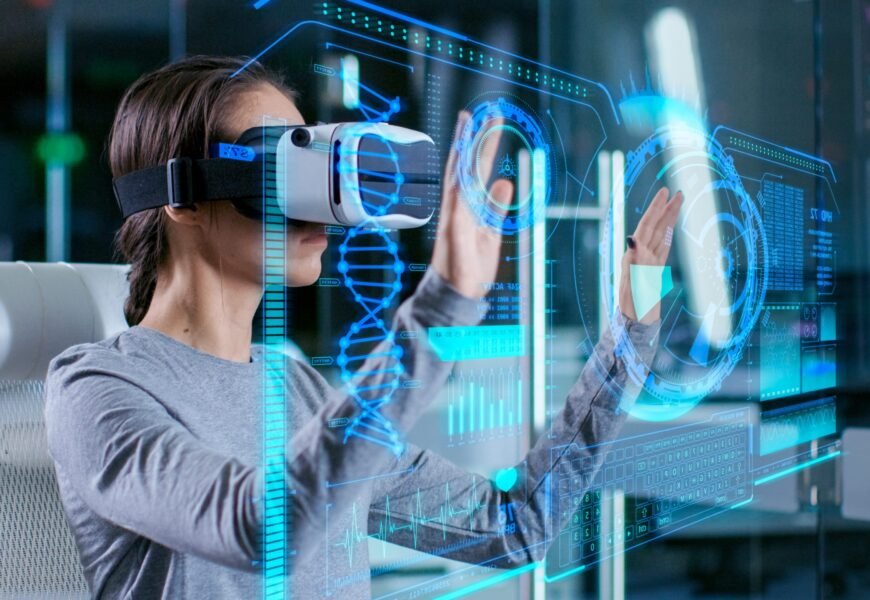Artificial Intelligence (AI) has become one of the most transformative technologies of our time, revolutionizing industries from healthcare to finance and beyond. As businesses seek to leverage AI for automation, decision-making, and efficiency, its future promises even greater potential. From enhancing human capabilities to creating new opportunities in every sector, the future of artificial intelligence is set to redefine how we interact with technology.
The Future of Artificial Intelligence
The future of artificial intelligence is not just about smarter algorithms or more efficient data processing—it’s about a profound shift in how machines understand and interact with the world around them. AI is rapidly evolving, with a market expected to grow to over $500 billion in the next few years. With this growth, we see AI playing a pivotal role in automating tasks, making data-driven predictions, and even developing creativity. The key to AI’s future lies in its ability to continuously learn and adapt, paving the way for innovations that we are only beginning to imagine.
AI-Powered Automation
Automation is one of the most immediate and visible applications of AI. By automating routine tasks, AI has allowed businesses to save time and resources. Manufacturing, customer service, and logistics are just a few examples of industries that have been transformed through AI-powered automation. This not only improves efficiency but also enables employees to focus on more complex, value-added activities. As AI becomes more sophisticated, its role in automating cognitive tasks, such as analyzing legal documents or creating marketing content, will become more prevalent.
Machine Learning Advancements
Machine learning (ML), a subset of AI, is at the forefront of many technological advancements. By using algorithms that can learn from data, ML enables computers to recognize patterns, predict outcomes, and make decisions with minimal human intervention. Recent innovations in deep learning, reinforcement learning, and neural networks have opened new possibilities in fields such as image recognition, speech processing, and recommendation systems. These advancements are creating opportunities for businesses to personalize user experiences like never before.
Natural Language Processing (NLP)
Natural Language Processing (NLP) allows AI systems to understand and interpret human language. Recent advancements in NLP have led to more accurate language models capable of translating, generating, and analyzing text. Chatbots, virtual assistants like Siri and Alexa, and automated customer support systems have all benefitted from these improvements. NLP not only enhances user interaction but also provides deeper insights into customer behavior and preferences through sentiment analysis and text mining. This evolution in language understanding is a major part of the future of AI, bridging the gap between humans and machines.
AI in Healthcare
The healthcare industry is experiencing a transformation through AI, with applications ranging from diagnostics to personalized medicine. AI systems can analyze medical data such as MRI scans, detect anomalies with higher accuracy than traditional methods, and even predict patient outcomes. This helps doctors make better, faster decisions and ultimately improves patient care. Additionally, AI-driven wearable devices can monitor patient health in real time, offering preventative measures before conditions become critical. As AI continues to integrate with healthcare, the potential for early detection of diseases and custom treatments becomes increasingly feasible.
Ethical AI Development
As AI becomes more embedded in our daily lives, the need for ethical AI development is becoming crucial. Concerns about bias in algorithms, data privacy, and accountability in AI decision-making have prompted a global discussion on responsible AI use. Addressing these challenges involves creating AI systems that are transparent, explainable, and unbiased. Various organizations and governments are now setting standards and regulations to ensure that AI operates fairly and ethically. The future of artificial intelligence will depend not only on technological advancement but also on our ability to create systems that serve society in an equitable and transparent manner.
AI in Cybersecurity
Cybersecurity is another critical area where AI is making a significant impact. With the increasing complexity of cyber threats, traditional security methods are often insufficient. AI can detect unusual patterns of behavior in networks, identify potential threats in real-time, and even respond to incidents faster than human operators. Machine learning models trained on vast datasets of attack patterns can predict future threats, helping organizations to stay one step ahead of cybercriminals. As cyberattacks become more sophisticated, AI’s role in securing digital infrastructure will be more vital than ever.
AI and Edge Computing
The combination of AI and edge computing is set to redefine data processing and decision-making. Unlike traditional cloud-based AI, which relies on centralized servers, edge computing enables AI to operate closer to where data is generated. This means faster processing, reduced latency, and lower bandwidth usage. AI-driven edge devices can analyze data directly at the source, such as in autonomous vehicles or smart home systems, making real-time decisions without relying on a distant server. This synergy is essential for applications that require immediate responses, like industrial automation and self-driving cars.
The Role of AI in Autonomous Vehicles
Autonomous vehicles are one of the most anticipated applications of AI, promising safer roads and more efficient transportation systems. AI powers the perception, decision-making, and navigation capabilities of self-driving cars. Through sensors and cameras, AI systems can interpret their environment, identify obstacles, and make driving decisions based on real-time data. The development of autonomous vehicles involves extensive testing and data collection to ensure safety and reliability. As AI technology matures, we can expect to see more self-driving cars, delivery drones, and autonomous public transportation systems.
AI in Finance
In the financial sector, AI is being utilized to enhance trading algorithms, assess risks, and provide personalized banking experiences. AI can analyze large volumes of financial data quickly, identifying trends and patterns that may not be evident to human analysts. Robo-advisors are using AI to manage investment portfolios, providing customers with automated, yet personalized, financial advice. Additionally, AI-driven fraud detection systems monitor transactions in real time, flagging any suspicious activities to prevent potential losses. The future of artificial intelligence in finance will continue to push towards more intuitive and secure financial services.
AI’s Influence on IoT
The integration of AI with the Internet of Things (IoT) is leading to the creation of smarter, more interconnected environments. By analyzing data collected from IoT devices, AI can optimize energy usage in smart homes, predict equipment failures in factories, and enhance user experiences in connected cities. The ability of AI to make sense of vast data streams from IoT devices enables predictive maintenance and operational efficiencies across industries. This synergy between AI and IoT is crucial for the development of smart infrastructure that adapts to the needs of its users.
Conclusion
The future of artificial intelligence holds immense promise, with innovations that are set to transform every industry. From automating mundane tasks to pioneering new ways of problem-solving, AI is shaping a world where machines and humans can work together more seamlessly. As we continue to develop and integrate AI technologies, the focus must remain on creating ethical, efficient, and user-centered solutions. The journey of AI is just beginning, and its future is bright with possibilities.












